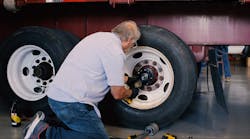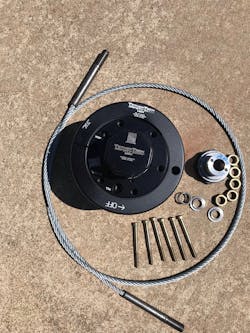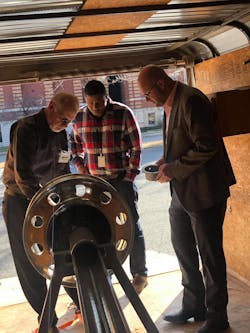One warm Friday evening in June 2013, Billy Turner, then the owner of a small fleet called BTEXP Global Services, was heading home from his office in Weatherford, Oklahoma, when he came across a “really bad wreck” on Interstate 40. A mangled Jeep was surrounded by first responders. He found out just how bad it was the following Monday when an employee filled him in.
A westbound tractor-trailer’s rear trailer axle lost a set of dual tires, which caromed over the median and struck the eastbound 1997 Jeep’s windshield. Inside were four teenagers from Texas. Two died of massive head trauma and two others, a pair of brothers, were hurt, one was left in critical condition. The parents of the injured teens were traveling ahead and witnessed the horrific accident in their rear-view mirror. Then they had to wait while the fire department reportedly spent 90 minutes freeing the teens who were trapped within the twisted vehicle's frame.
“It just seemed like the most horrible thing anybody would ever have to go through,” Turner said, who would soon devise a device to prevent wheel-off accidents like this from ever happening.
Called the TetherTech Hub System, the trailer wheel-end solution is made up of a handful of aircraft-grade aluminum fastening pieces for each wheel-end and a steel cable that holds them together through the axle. A typical trailer should install one per axle, which takes about an hour per device.“The cable connects moving parts by going through the center of the axle and attaches to each hub on either end of the axle,” Turner explained. “And that way, your wheels can’t leave when you have a failure because it’s all tied together. All of that clamping force that those lug nuts were holding there now is transferred to the TetherTech system.”
It's been tested by the military and approved by the Oklahoma Department of Transportation, which uses the roughly $1,800 device in its trailer axles, Turner said. The state is in the final process of providing tax incentives for fleets that purchase the TetherTech Hub, and the distributor told FleetOwner's sister publication Fleet Maintenance it won't be long before 100,000 devices are sold.
So far there have been no failures.
“We’ve run [the TetherTech system] for hundreds of miles with no bearing, no lug nuts, or anything, and it’s never lost any wheels,” Turner said. “After all of the torture testing that has been done to it, nobody has been able to make it turn the tires and wheels loose.”
But this didn't all happen because of one tragic wreck. While seeing that shook Turner, what really put him on his journey happened a few weeks later. One of his own 20 trailers returned with a missing set of duals. Fortunately, their disappearance did not cause an accident, Turner said. But if he knew of two wheel-offs just in his little stretch of the Sooner State, maybe the death of those teens, which was labeled a “freak accident,” wasn't all that uncommon.
“I started finding out it happens a whole lot more,” he noted.
'Darkest Secret'
MEA Forensics estimates there are 50,000 wheel-off events in North America annually, though Mark Bailey, who leads MEA’s Failure Analysis Group, said “there is no authority that keeps stats on wheel separations.”
Dave Walters, manager of warranty and field service at Alcoa and director-at-large for American Trucking Associations' Technology & Maintenance Council, calls it “the darkest secret in our industry.” During an Alcoa podcast, he recalled that while in an open forum at a TMC event, fleets would not admit they fell victim to wheel-offs, though in a private discussion, someone from a major carrier revealed that keeping it under 100 wheel-offs “was a pretty good year.”
A wheel-off can be caused by a bearing or wheel-end failure, or the studs or lug nuts snapping off. TMC RP 644A outlines how to detect damage to the wheel ends. Eliminating dirt and contamination around the fasteners, proper lubrication, and torqueing are basic ways to prevent wheel-offs. After a wheel-end is removed for maintenance or a tire change, the fasteners should be retorqued at 50 to 100 miles.
Once it nearly happened to him: Turner saw smoke from the hub, created by friction from the failing wheel bearing, and pulled over. That friction can heat the runaway wheel-end to 2,000 degrees Fahrenheit. That not only melts the spindle, but it can start a brush fire if the rubber wrecking ball hits a dry patch on the side of the road. Even though Turner's wheel never detached, his trailer's spindle and hub were destroyed.
Turner started checking around for ways to prevent these wheel-off events when maintenance is lacking.
“There’s nothing out there,” all the distributors he spoke with told him.
This gave the former NASCAR driver a new challenge: “I just sat down and made it my mission to figure out a way to stop that.”
Turner had been involved with automotive engineering since he was an 8-year-old tinkering with go-karts, and though he had no formal engineering education, within five years he had invented a mechanical fastening device—with the help of the engineering department at Oklahoma State University—which has the potential to stop wheel-off events dead in their tracks.
All Around Distribution sells the safety device, and every part is manufactured by Oklahoma City-based American Machining Solutions. Not to belabor how prevalent wheel-offs are, but Turner noted an investor in the machine shop told him a set of duals once bounced off I-35 and into his daughter’s bedroom.
“It just happens a lot more frequently than people can even imagine,” Turner reiterated, rattling off several other instances.
'Steaking' a claim
Even when a trailer wheel-off does not lead to injury or loss of life, the consequences can be catastrophic for a carrier, especially one that hauls perishable refrigerated goods. Bishop Trucking found this out firsthand, which is why the small Oklahoma-based fleet—which does both cold chain and oil-field work—began using TetherTech last fall.
“We had one hub-related failure where we lost everything on a reefer trailer—both wheels, both tires, brake drums,” recalled Joe Madore, manager of Bishop Trucking. “It pretty much just took that whole corner off the trailer.”
The company was moving a full load of beef, and the severe damage put the delivery three days behind schedule. That also pushed the meat three days closer to the expiration date, forcing the shipper to reduce the price. “We ended up paying for half that load,” Madore said. “That was a $70,000 claim.”
A few months later, a flatbed used for oil-field work also lost a wheel.
See also: Mock trial demos depth of wheel-off liability
“The first thing that goes through your mind is, ‘Oh, my God. I’m getting a phone call that somebody’s dead or there’s huge amounts of property damage,’” Madore said. “We were fortunate in both of ours that we lost them out in the middle of the country. We actually ended up finding both sets of wheels and tires just down the middle of the field.”
Madore said the lug nuts completely snapped off the hub and attached to the wheel. Both trailers had recently been acquired from a larger fleet and had recently received annual inspections. “We hadn’t even gone in and inspected them ourselves,” Madore said. He believes there was likely a torqueing issue.
Madore raced in the same circles as Turner decades ago and had wanted to try out TetherTech, but his trailers used automatic tire inflation systems (ATIS), and TetherTech at the time was not compatible. The latest iteration of the device does work with ATIS, and Madore started installing them last fall.
Bishop Trucking now has the TetherTech system on the front and rear axles of all of its trailers in an effort to protect expensive cargo and the company.
“If you just put it on the rear axle and then the front axle comes off, it’d really make you look liable,” Madore said, in the event of an accident and the following litigation. “You won’t go to jail for it, but you’d probably go to the poor house.”
Tying in TCO
For Madore, accident prevention as well as a clean conscience outweigh any options of a return on investment. He insists he couldn’t face a victim’s family knowing “loved ones are dead because I was worried about $2,500.”He also experienced those costly wheel-offs, which on the repair side alone can reach $11,000.
Turner explained that along with replacing the tire, wheel, and brake drum, “the spindle is all chewed up and melted.”
“You can’t even put tires back on, so you have to call someone out, and I have to cut that spindle off and weld a new one on,” he added. “You’ve got to wait 24 hours to put it back together because you can’t cool that real quick or you quench it.”
All Around, which started distributing TetherTech last June, has sold thousands of products so far. David Key, president of All Around, expects that number to surpass 100,000, based on recent testing that indicated other maintenance benefits. According to Key, TetherTech hubs prevent wheel-end play, bearing wear, and tire wear.
“This product holds all bearing components and wheels in place squarely to perfection due to the spring load on the cable and system,” he said. “This keeps the bearings at optimal wheel-end play without letting the wear cause needed adjustments on a consistent basis.
“This product not only saves the lives of the public but also will pay for itself the first year,” Key asserted.
In Oklahoma, the ROI soon will be better, assuming a state bill is approved this summer by the house. Senate Bill 735 would establish the Justin Sullivan Trailer Safety Act and provide tax credits of up to $10,000 to fleets that purchase safe wheel-tethering systems.
Justin Sullivan was an 18-year-old who was killed by a wayward wheel in 2002. The day before his death, the standout catcher eyeing the Major League Baseball draft was named Player of the Year by The Daily Oklahoman.
Turner said he has become close with the Sullivan family—and if he has his way, he’ll never meet another one like them, one devastated by a preventable tragedy.
This article originally appeared in its entirety on Fleet Maintenance, FleetOwner's sister publication and part of the Endeavor Commercial Vehicle Group.






